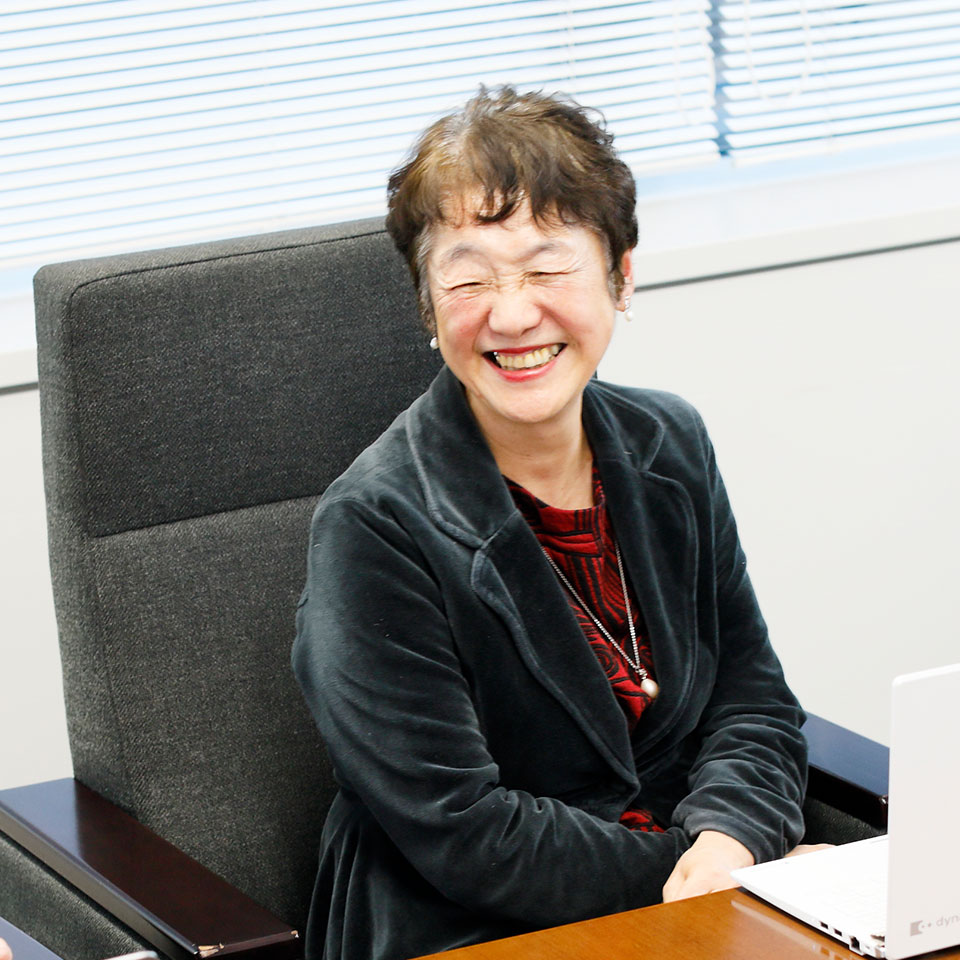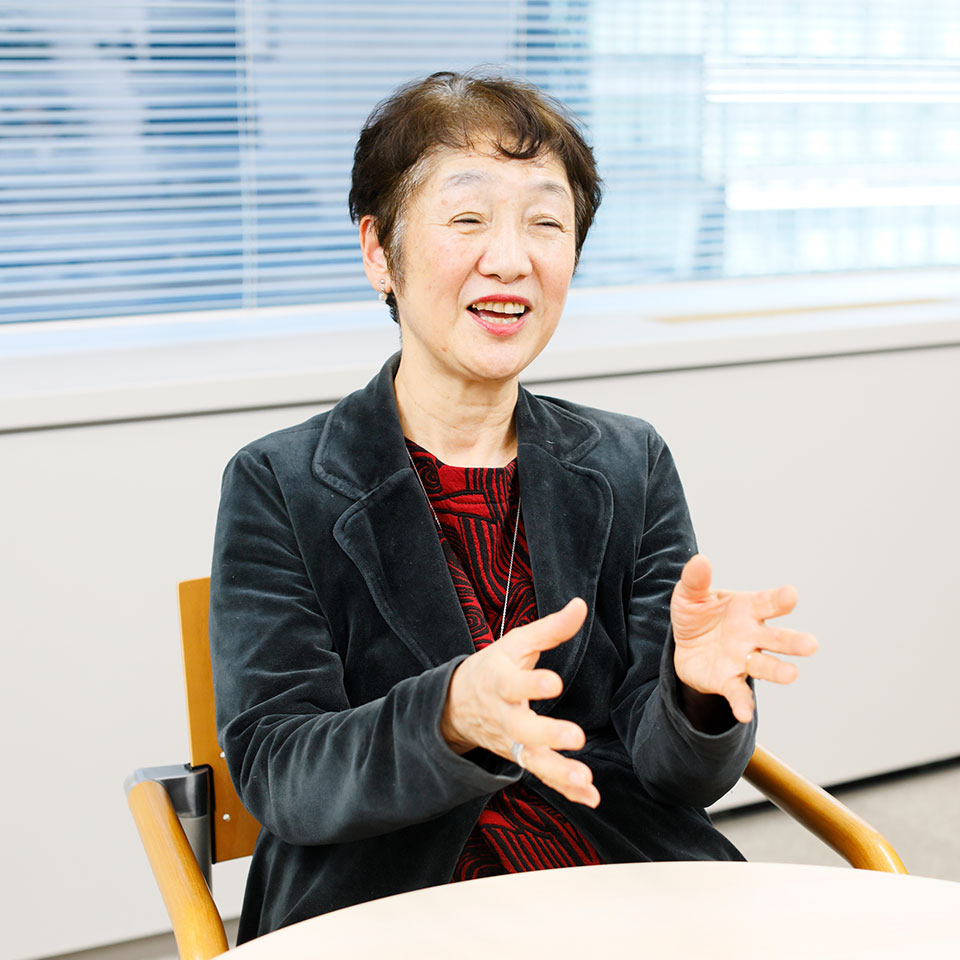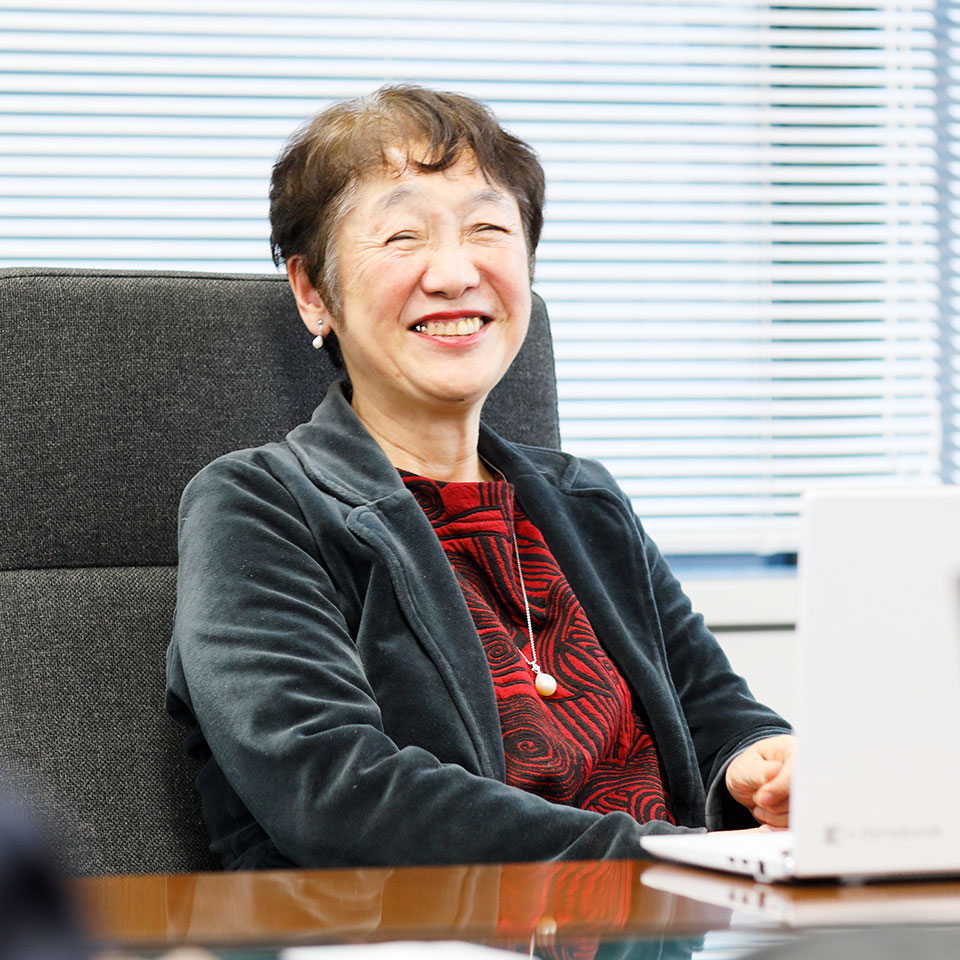
Hello, I am Doi. I joined one of major electrical equipment manufacturers in Japan in 1979. Since then, I have worked on many unprecedented challenges as a female researcher. Requested to make use of such experiences at NITC, I took the current position as Auditor in 2014.
At a major crossroads in your life, you may be wondering now what type of environment you should choose to continue your research. Taking this opportunity, I would like to introduce, on the basis of my experience so far, three barriers that may arise in your life, and the "Blue Bear" principle, which helps you overcome these barriers and proceed with your research. At the same time, I will talk about NICT and what kind of human resources is required here from my point of view. I hope that you can use it as a reference in choosing your career path.

Everyone can encounter barriers at work. In particular, I think there are three major barriers. I would like to talk about these barriers and how to break them.
When I joined the company, I was the first woman, in the histories of both the company and my university, to enter a company after completing the master's program. Because there was no precedent of a female researcher working there, things often did not go smoothly. In such a situation, we must think reversely. As in working on papers and patents, what you can do is to show that there is a precedent, that is, you can set a precedent yourself.
NICT is Japan's only public research institute specializing in information and communication technology (ICT). As you may all know, this field is changing extremely rapidly. There are so many unprecedented challenges. To cope with such a situation, young people who can think flexibly and set a precedent themselves are strongly needed.
After joining the company, I became a mother of two children. Then, I came to face many things that I had no control over. This means that I did not have enough time for everything. However, by reviewing the priorities and focusing on each task, I learned how to better control my schedule.
While raising children, we encounter a succession of unexpected incidents. It is difficult to have enough time for everything. NICT, however, provides an environment that lets you work flexibly at various locations at your convenient time through teleworking and the discretionary working systems. The institute also offers an extensive welfare program. As a researcher and as a parent, we enjoy this environment where we can both enrich our personal life, including child rearing, and produce satisfactory research results, by selecting and concentrating resources.
When I first became a leader, I was so afraid of failure that I tried to do everything myself. This made us unable to address new challenges. However, by identifying the aptitude of the members and sharing the team's goal among them, I gradually managed to expand possibilities of each member and made the team achieve the goal finally.
NICT offers an environment where even young people are entrusted with responsibility to take on many challenges. In cooperation with experienced researchers, you can conduct various research and development projects by maximizing your potential.
So far, I have talked about the three barriers that you may encounter in the future. However, I think that there are times when research does not go well while working as a researcher.
Next, I will introduce a "blue bear" (aoi kuma in Japanese), which sometimes dances in my head. The Blue Bear (Aoi Kuma) principle consists of five simple rules, each of which starts with a Japanese hiragana character: a, o, i, ku, or ma. The principle was posted in my child's laboratory. I don't know its source, so I would like to introduce my own interpretation. At the same time, I will introduce what is expected of people working at NICT.
Whether you rush or not depends largely on the amount of information you have gained and the time you are granted before making a decision. I know that many of you floundered around while conducting research when you could not get the expected result immediately. It is very important, even in such a case, that you do not rush.
NICT is a public organization for research and development, where a large amount of information is gathered. At the Institute, you can conduct medium- to long-term research, instead of seeking immediate results. We look for people who can conduct research without rushing, maintaining a medium- to long-term perspective, while seeking a way to put the results into practical application.
Even if you think you have had a good dialog with a person, you often find out later that you did not communicate well with the person. When talking to researchers outside your field, I think there were times when you could not understand well what the other person was saying. In such a case, it is essential to calmly listen to the other person and analyze dispassionately what difference lies in thinking between you and the other person.
NICT is actively collaborating with universities, industry, local governments, and research institutes in Japan and overseas. You will have several opportunities here to talk with researchers that you have never spoken to before. We look for people who can calmly understand other people's ideas and actively promote collaboration with other fields.
Sometimes you may be proud of your achievements. However, many people are involved in your research. You receive advice from your laboratory instructors and colleagues and support from the administrative staff. It is important to keep in mind that you can concentrate on your research because you have someone to support you.
At NICT, researchers are often involved in national projects. We have a well-established support system to help everyone produce sound research results. We look for people who can play an active role in achieving results for the entire NICT in cooperation with supporting departments.
In the course of your research, you may become disgusted and despise yourself when things go wrong. In such a situation, it is important to move on to your next thought.
Society has high expectations of NICT because of its past research results and its position as a public institute. There are however times when we cannot achieve good results. We look for people who can continue to take on challenges without getting disheartened even in such hard times.
I think you have many rivals in your research field. You must remember that you can improve yourself by competing with such rivals. Conversely, the one that you must defeat is yourself. As shown in the quote by Lao-tse, “Those who understand others are clever, but those who know themselves are truly wise,” it is important to know what you are good at and develop it. Then, you must work on turning your weakness into a strength.
NICT is Japan's only public research institute specializing in information and communications, which is expected to produce advanced research results, representing Japan. To this end, we need people who can grow every day and acquire a competitive edge to survive in the global environment.

There are not many female researchers yet in the field of information and communication. However, in the coming era of revolution through digital transformation, the viewpoints and flexibility of women will be a major strength in the open innovation paradigm that NICT aims to achieve. NICT has an environment and systems that allow diversity and ensure researchers to build careers through various life stages. At the institute, there are female researchers who are active in many positions, producing substantial research results. Thus, I believe that women can work here with a peace of mind.
It is not easy to overcome the three barriers I mentioned earlier and always keep the Blue Bear principles in mind. However, NICT has a wonderful research environment that helps you realize this, with diverse and distinguished researchers that you can compete with to improve one another. I hope that many female researchers and young researchers will choose NICT as their place to shine.
DOI completed her master's program at the University of Tokyo Graduate School of Engineering in 1979. In the same year, she joined Toshiba Corporation. She obtained her Ph.D. (Engineering) at The University of Tokyo. After working as Senior Fellow at Human Centric Laboratory of Toshiba Corporate R&D Center and as Senior Fellow and Chief Fellow at Toshiba Corporate R&D Center, she took her current position at NICT in 2014. Specializing in human interface, she has engaged in research and development of Japanese word processor, machine translation, electronic publishing, CG, VR, gesture interface, route guidance service, wearable computer, mobile EC, and network robots.
If you have any questions regarding recruitment, please contact us below.
RECRUITING
INFORMATION